Drum Cell Filter
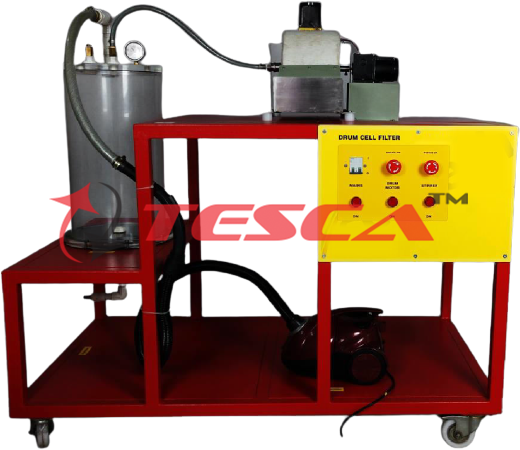
Order Code: 32109
Category: Fluid Mechanics Lab
Features: Separation of solids from suspensions with a drum cell filter Continuous removal of filter cake Practical experiments on a laboratory scale Tesca Drum Cell Filters can be used to separate solids continuously from suspensions. The suspen...
SPECIFICATION
Features:
Separation of solids from suspensions with a drum cell filter
Continuous removal of filter cake
Practical experiments on a laboratory scale
Tesca Drum Cell Filters can be used to separate solids continuously from suspensions. The suspension unit produces a suspension of diatomite and water. A pump conveys the suspension into the suspension tank of the drum cell filter. A stirrer keeps the solid particles in the suspension suspended. Part of the rotating drum dips into the suspension. The jacket of the drum is perforated and covered over with a filter cloth. The drum is divided into cells. Each cell is joined by a hollow shaft to a vacuum line. The vacuum sucks filtrate through the filter cloth into the drum. From there it is carried in a collector tank which is under vacuum. The solid is separated off at the filter cloth. Consequently, a filter cake that steadily grows in the direction of rotation is created on the immersed part of the drum. When the filter cake is drawn out of the suspension by the rotating motion, it is drained of water by the applied vacuum. A scraper scrapes the filter cake off of the drum before the drum dips back into the suspension. Compressed air can also be used to remove the filter cake. The filter cake drops into a collector tank.
The flow rate of the supplied suspension is adjusted on the suspension unit. The level in the suspension tank of the drum cell filter can be adjusted by way of an adjustable overflow. The applied negative pressure is indicated by a manometer on the vacuum tank. The rotation speed of the drum is infinitely variable.
Compressed air and vacuum connections are required to operate the trainer.
Specifications:
1. Continuous cake filtration of suspensions with a drum cell filter
2. Rotating perforated drum, partially immersed in suspension, with filter cloth
3. Vacuum inside the drum to draw off filtrate and the dry filter cake
4. Continuous removal of filter cake with an adjustable scraper or compressed air
5. Drum speed infinitely variable
6. Plastic vacuum tank to collect filtrate
7. Suspension tank with stirrer and overflow
8. Plastic collector tank for filter cake
9. Production and transport of suspension with the suspension unit
Technical Specifications:
Drum
Filter area: approx. 0,1m2
Speed: approx. 0,1…3min-1
Motor power consumption: approx. 300W Stirrer
Speed: approx. 15min-1
Motor power consumption: approx. 120W Tanks
Filtrate vacuum tank: approx. 30L
Filter cake collector tank: approx. 30L
Suspension: approx. 3L Measuring ranges
Pressure: -1…0bar (vacuum tank)
0…2bar (compressed air for cake removal)
Experiments:
Learning the basic principle and method of operation of a drum cell filter
Fundamentals of cake filtration: Darcy’s equation
Variation in time of filtrate quantity, filter cake mass, and thickness
Filter cake mass and thickness dependent on filtrate quantity, negative pressure, and drum speed
Requirements:
Mains Power 220 – 240V @ 50Hz, 1Ph

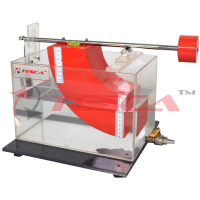
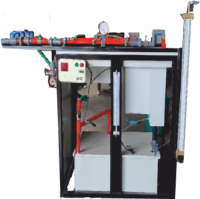
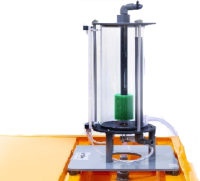
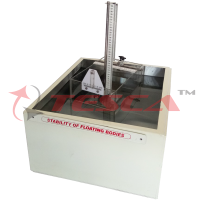
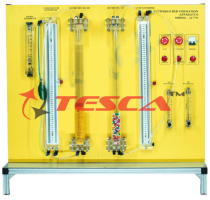
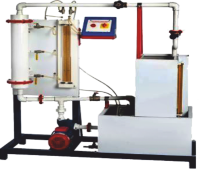

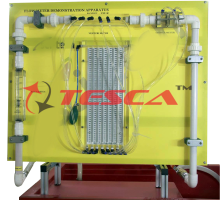
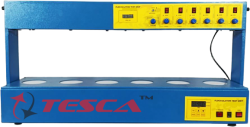

 91-9829132777
91-9829132777